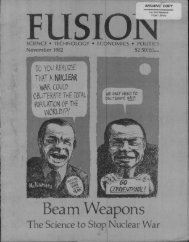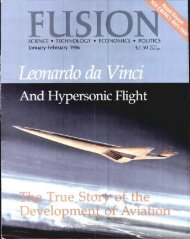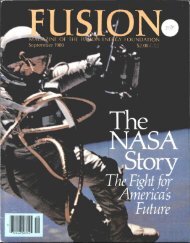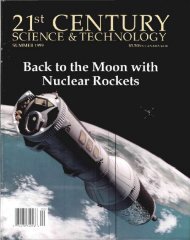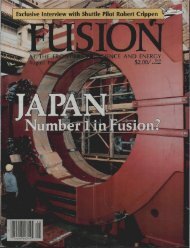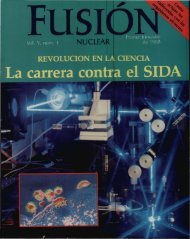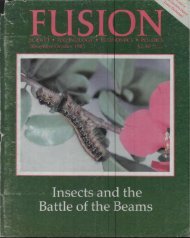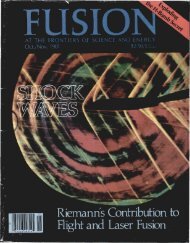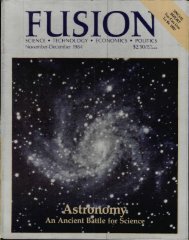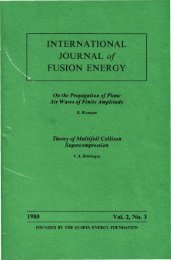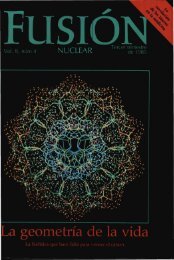You also want an ePaper? Increase the reach of your titles
YUMPU automatically turns print PDFs into web optimized ePapers that Google loves.
were estimated using the Riemann-<br />
LaRouche economic model, which is<br />
designed to quantify such nonlinear<br />
progressions.<br />
The essential role of nuclear power<br />
in overcoming present constraints<br />
on Third World development was<br />
stressed by other conference speakers,<br />
including Professor W. Seifritz of<br />
the Eidgenossisches Institut fiir Reaktorforschung<br />
in Wurenlingen, Switzerland.<br />
Seifritz, a leading European<br />
spokesman for nuclear power, presented<br />
detailed arguments showing<br />
that only a "brute force" development<br />
of nuclear energy can provide<br />
sufficient resources to feed the expanded<br />
global population by 2020.<br />
Another conference participant,<br />
K.D. Malaviya, former Indian minister<br />
for petroleum and chemicals, affirmed<br />
that "Our Atomic Energy<br />
Commission is aiming at the installation<br />
of 10 gigawatts of nuclear power<br />
capacity by the end of the century.<br />
My case is that India must produce 50<br />
gigawatts of energy by the end of the<br />
century." Malaviya, a close collaborator<br />
of Jawaharlal Nehru, is known as<br />
the father of India's oil industry.<br />
Other speakers stressed the need<br />
for Western European participation in<br />
the development of the southern<br />
hemisphere. "Our problem today in<br />
both developed and developing<br />
countries is the monetarists and their<br />
agencies like the International Monetary<br />
Fund," bluntly asserted K. Raghunath<br />
Reddy, India's former minister<br />
of state for industrial development.<br />
"Liberation of mankind from poverty<br />
and suffering, want and sorrow,<br />
is within the reach of man. Both technology<br />
and world resources can provide<br />
abundance. What is wanting is<br />
the political will." (See box for excerpts<br />
of Reddy's speech.)<br />
Ganesh Shukla, editor of the Indian<br />
weekly New Wave, pointed to increasing<br />
famine, epidemic disease,<br />
and social chaos in the Third World<br />
as "flashpoints" for East-West military<br />
confrontation.<br />
The Frankfurt conference followed<br />
an April 29 seminar in Paris and April<br />
23 seminars in Milan and Washington,<br />
D.C. on the subject of Indian development.<br />
—Susan Johnson<br />
AIAA Annual Meeting, Baltimore, May 6-8<br />
The Aerospace Industry:<br />
Technology or Geopolitics<br />
Top executives and engineers in the<br />
aerospace industry attending the annual<br />
meeting of the American Institute<br />
of Aeronautics and Astronautics<br />
in Baltimore May 6-8 heard a very<br />
mixed set of presentations under the<br />
theme "Global Technology 2000." European<br />
speakers, in particular, discussed<br />
the challenges in space exploration,<br />
flight, and military technology<br />
the industry will face over the next 20<br />
years. By contrast, others at the conference,<br />
led by British spokesmen,<br />
termed new technology entirely inappropriate<br />
for the coming period's<br />
"geopolitics."<br />
Reinhardt Abraham, an executive<br />
with Deutsche Lufthansa airlines in<br />
West Germany, focused on the future<br />
of air transportation. Reviewing the<br />
drop in aircraft orders since 1973,<br />
Abraham indicated that $60 billion<br />
would be needed in capital investment<br />
in the industry worldwide in the<br />
next decade, vectored for new technology<br />
that could extend the lifetime<br />
and productivity of air transport vehicles.<br />
"There may be acute fuel shortages<br />
and rising prices," he acknowledged,<br />
but the industry must "prepare to<br />
solve the fuel problem with advanced<br />
technology." New developments—<br />
"radical concepts"—are needed in<br />
engine design and the aerodynamics<br />
of plane design, he said.<br />
The second speaker on the program<br />
was Dr. Reimer Lust, president of the<br />
Max Planck Institute in Germany, who<br />
stressed the importance of cooperation<br />
between Europe and the United<br />
States. The United States, he recalled,<br />
had helped form the European space<br />
research organization in the mid-<br />
1960s. "In general," he said, "scientific<br />
discoveries are unpredictable,"<br />
but nevertheless must be the essential<br />
consideration of the industry.<br />
In the next 20 years, "we will do<br />
plasma experiments in situ, we will<br />
extend our knowledge in astronomy<br />
Lord Chalfont: "There should be less<br />
technology."<br />
and astrophysics, study the earth's and<br />
planets' atmospheres, and study geodesy<br />
and geophysics." He proposed<br />
that U.S.-European collaboration concentrate<br />
on an orbiting telescope, the<br />
exploration of outer space, and continued<br />
earth-oriented observation<br />
from space.<br />
"Europe has a future highly dependent<br />
on technological innovation,"<br />
Lust stated. "This is very good<br />
for international cooperation. . . ."<br />
The change in tone was abrupt,<br />
however, for Lord Chalfont's speech,<br />
titled "Defense Systems: An Allied<br />
Perspective." Every U.S. aerospace<br />
company that is involved in commercial<br />
aircraft production and the space<br />
program is also involved in weaponsrelated<br />
production. However, few<br />
present shared Lord Chalfont's "geopolitical"<br />
perspective for the industry.<br />
Chalfont began by stating that what<br />
he was about to say was his personal<br />
view and not necessarily that of the<br />
British government; on the other<br />
hand, as if to caution them that they<br />
had better listen closely, he reminded<br />
the audience that he is, after all, a<br />
76 FUSION August 1980



